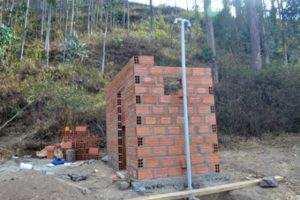From Sept. 21 to Oct. 1, The University of Tulsa’s chapter of Engineers Without Borders USA (EWB-USA) led the implementation of a latrine/shower project in Machacamarca-Micacuni, Bolivia, which is a rural agricultural community about 70 miles northwest of the capital, La Paz. The small town had limited access to latrines and showers, resulting in unsanitary conditions for residents.
Prior to this, members of TU’s chapter had traveled to Machacamarca-Micacuni twice: in 2017 for an assessment trip and in 2018 to build two prototype units. Soon after their 2018 expedition, however, a series of political protests followed by the COVID-19 pandemic put a halt to further trips. This year, TU members were able to resume the project using virtual technology.

Advised by Laura P. Ford, an associate professor of chemical engineering, TU’s chapter worked remotely to build two more latrine/shower units while teaching community members how to build additional units. During the process, the TU team collaborated with Ricardo Condori, a member of Engineers in Action, who did the onsite implementation on their behalf. Condori used instructions sent from TU and materials that were delivered to the community, staying in contact with the team in Tulsa the entire time. In this way, Condori built two structures, each one consisting of a shower that uses gravity-fed water from up the mountain and a latrine that is flushed using water drained from the shower.
“After this initial implementation, we plan to conduct a follow-up with the community to check on their progress building eight more units,” explained Ford. “The families will give us feedback on the structures that we built to ensure necessary changes are made before more are constructed. The goal is to build an increasing number of latrine/shower structures on future implementation trips to improve the community’s access to proper sanitation practices.”
Skills and benefits for all
While members of the Bolivian community gleaned important skills about sanitation engineering through the project, the TU students developed their skills and knowledge.
 Nathan Weiskopf, a senior double-majoring in chemical engineering and chemistry, served as the student team lead for the project, which entailed facilitating communication between all parties involved while also leading team meetings, spearheading fundraising and helping solve problems. He said that the EWB-USA project has been a rewarding way to get involved in an effort that transcends textbook equations and, instead, deals with something even more important: changing lives.
Nathan Weiskopf, a senior double-majoring in chemical engineering and chemistry, served as the student team lead for the project, which entailed facilitating communication between all parties involved while also leading team meetings, spearheading fundraising and helping solve problems. He said that the EWB-USA project has been a rewarding way to get involved in an effort that transcends textbook equations and, instead, deals with something even more important: changing lives.
Weiskopf originally joined the project in order to get more involved with his field of study. He has been thrilled, however, to witness the beneficial impact of the team’s work on the Bolivian community’s well-being. “Being involved with this project has been an important part of the enriching experience at TU,” Weiskopf said. “I’ve learned so much about what it means to work effectively as a team and be a leader. I’ve expanded my worldview by communicating with people from different cultures than mine, and I’ve picked up other skills that will be very valuable for my future career. It’s awesome to know that I’m contributing to such a good cause, and I believe this opportunity has stressed the importance of doing good for others without expecting anything in return.”
 Funding for the Tulsa chapter’s project came from Ford’s Chapman professorship as well as restaurant nights, a silent auction, the Bovaird Foundation, a Water Fast Fundraiser and the dean of TU’s College of Engineering and Natural Sciences.
Funding for the Tulsa chapter’s project came from Ford’s Chapman professorship as well as restaurant nights, a silent auction, the Bovaird Foundation, a Water Fast Fundraiser and the dean of TU’s College of Engineering and Natural Sciences.
Learn more about the EWB-USA Tulsa chapter projects and the College of Engineering & Natural Sciences.






